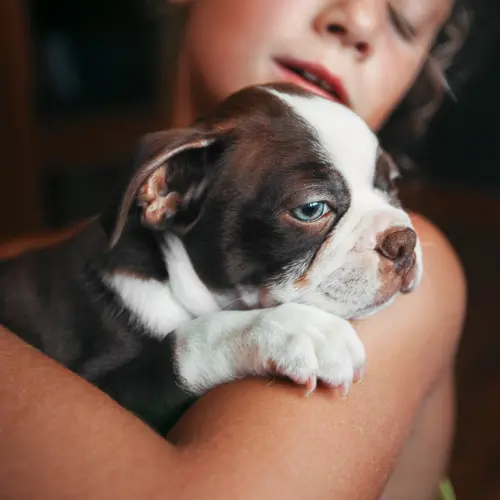Chasing cars is a part of some dogs’ natural instincts. For others, it’s a habit formed over years. As much fun as dogs have with chasing, it can be stressful for dog owners.
Car chasing presents a dangerous situation for pets and people alike. Cars may swerve to avoid a crash, or dogs may be hit while in traffic. Learning how to stop this behavior can be tough, but with training, you can help your dog learn to stop chasing cars. If it’s an ongoing problem with your pet, professional dog trainers and behaviorists can help.
Tips for Changing Your Dog’s Behavior
The most effective way to stop a dog from ever chasing cars is prevention. It’s easiest to identify and change the behavior in puppies before it becomes a habit. However, if your dog is already chasing cars, you can use a few tricks to correct their behavior.
Keep them safe & secure. Fencing in your yard, putting locks on outdoor gates or keeping your dog crated inside are all good options.
Do some training. You can bring your dog to training classes or hire a professional dog trainer. Either way it’s a great way to set the foundation for good behavior in dogs.
Try training tools. Some dog training tools let out a hissing noise and release calming pheromones that help to distract and calm your dog. If you’re considering a training tool, consult your vet or professional dog trainer first.
Incorporate clicker training. Clicker training is a positive reinforcement method of training dogs. Each time a dog does what you want — such as coming to you when you say “come” — you click the clicker device and reward them with a treat. After using the clicker repeatedly, the dog will start associating it with good things like praise and food. This will motivate them to listen when they hear the clicking noise.
Remember that you’re in it together. Both you and your dog are learning to understand each other and sometimes it takes time.
Games for Dogs Who Chase Cars
One way to stop your dog from chasing cars is with fun games that give them the thrill of the chase without involving moving vehicles. A few options include:
Fetch. Spend time throwing toys and letting your dog bring them back to you in a friendly game of fetch.
Tug. Playing tug of war with your dog is a good way to help them get rid of excess energy and use their problem-solving abilities. You can boost training by incorporating a command for them to “drop” the rope in mid-play. This can help reinforce impulse control. Reward them for the right behavior with a treat.
Tag. Tag can be a fun way to bond with your pet while teaching them to follow your command. You can try this by encouraging your dog to chase after you in a safe area and rewarding them with a treat when they approach you. Keep things relaxed and praise your dog for coming to you when you call.
Lure Coursing and Fast Coursing Ability Tests. These are both professionally organized sports for dogs that involve having dogs chase a mechanically operated lure. The lure moves quickly just above the ground, stimulating a real hunt. This gives dogs a chance to actively chase the “prey” in a fun and safe environment.
Chasing cars can sometimes be so ingrained in dogs that it can be hard to make them stop. After all, it’s a part of their natural instinct to want to run and hunt. In addition to trying different games, you can incorporate these ideas as well.
- Keep your dog on a leash or in a fenced-in yard to prevent them from chasing any distractions.
- Don’t allow your dog off-leash whenever you go for a walk.
- Train your dog to come to you when you call and practice training them in impulse control. If they do run, they’ll be more likely to come back to you.
- Seek help from a dog behaviorist. Professionals trained in dog behavior can help you understand your pet and what motivates them to run after cars. They can also help to develop a game plan so you’ll know what to do when your dog attempts to run.
What Not to Do With Dogs Who Chase Cars
Some pet stores sell items meant to deter your dog from poor behavior. Training with positive reinforcement is typically more successful with dogs than punishment. Consult a professional dog behaviorist to be sure deterrents you’re considering aren’t harmful to your pet. No matter how frustrating their behavior, always treat your dog humanely.
Some dogs get so excited about the opportunity to chase that trying to stop them seems impossible. Experiment with different techniques and work on forming a trusting relationship with your dog. Bring in a Behavior Specialist for Your Dog if needed.
- Allow your dog to chase after cars.
- Never mistreat or physically punish your dog.
- Confine your puppy or dog for long hours at a time.
- Leave your puppy or dog unsupervised outside.
Remember that your dog is acting out of instinct. The best approach if your dog chases cars is to understand their behavior, provide supportive training, and keep their environment safe.


